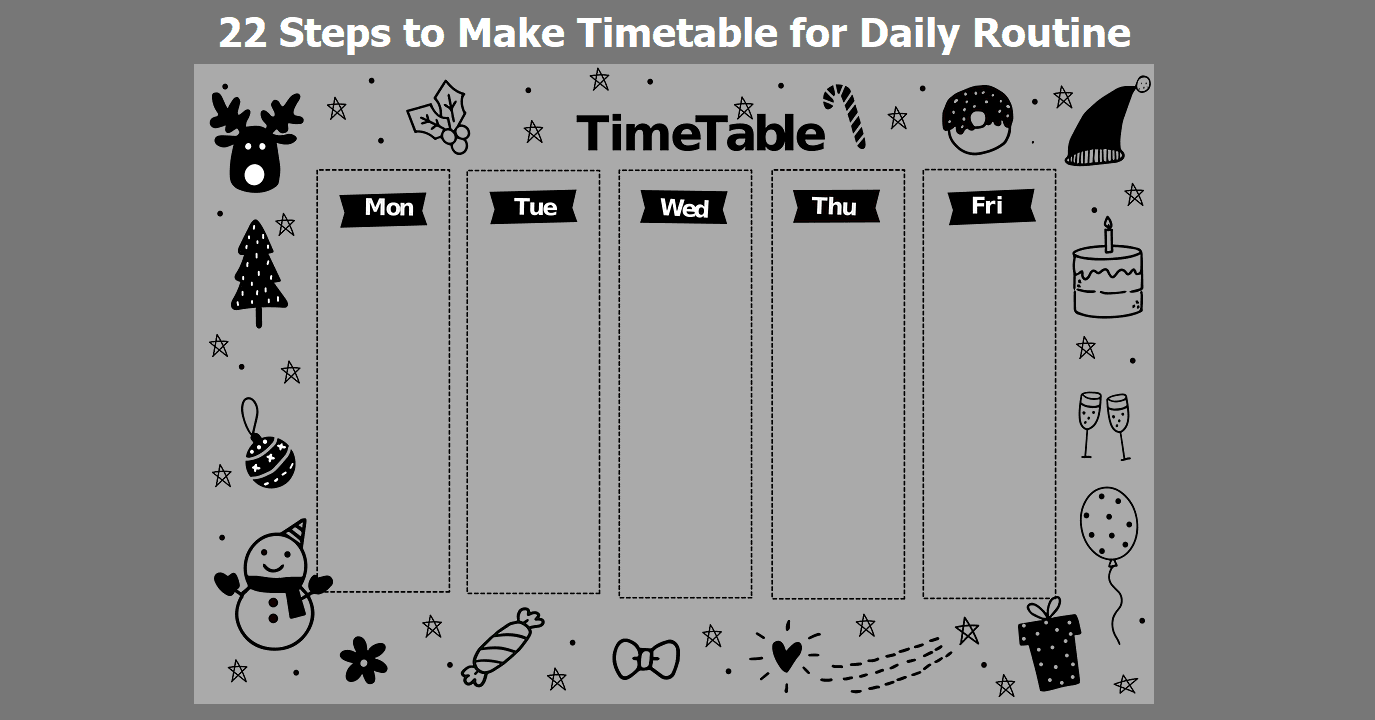
How to Create a Daily Routine Timetable
A daily timetable is a structured plan that outlines your daily activities, assigning each task a specific time slot. It helps improve time management, reduce stress, and create a healthier balance between responsibilities and relaxation. By customizing your routine, you can increase your productivity and stay focused on what matters most.
What Is a Daily Routine Timetable?
A daily routine timetable is a clear schedule that includes your essential tasks, responsibilities, and time for personal well-being. It reflects your daily time—covering work, study, meals, exercise, rest, and recreation. It allows you to:
-
Maintain consistency
-
Stay on top of deadlines
-
Prioritize personal well-being
-
Allocate time effectively
Benefits of Having a Timetable
Improves Time Management
Allocating specific hours to each task prevents wasting time and helps build discipline.
Reduces Stress
A timetable gives you control over your day, helping you feel more prepared and less overwhelmed.
Enhances Focus and Productivity
You’re less likely to multitask or get distracted when your tasks are planned.
Supports Work-Life Balance
You can ensure time is reserved for both duties and personal enjoyment.
Builds Good Habits
Sticking to a structured routine promotes healthy and consistent habits over time.
Steps to Create a Daily Timetable
Follow these 22 practical steps to build a routine that works for your lifestyle.
1. Assess Your Available Time
Start by identifying your non-negotiable commitments, such as work, school, or caregiving responsibilities.
2. List Your Daily Tasks
Write down everything you need to do each day, including meals, exercise, travel, study, cleaning, and self-care.
3. Assign Time to Each Activity
Estimate how long each task will take. Be realistic and allow buffer time between tasks.
4. Include Breaks
Add short and long breaks throughout your day to rest and recharge.
5. Review and Adjust
Test your timetable for a few days and refine it based on what works best.
6. Stick to the Schedule
Aim to follow your routine consistently. It may feel challenging initially, but it becomes easier with practice.
7. Stay Flexible
Life is unpredictable. Make room for unexpected changes or shifting priorities.
8. Use a Planner or App
Use a paper planner, wall chart, or digital calendar to visualize and manage your schedule.
9. Prioritize Self-Care
Ensure your plan includes adequate sleep, hygiene, meals, and relaxation.
10. Schedule Time for Hobbies
Include time for things that make you happy, like music, reading, or a creative project.
11. Turn It into a Habit
Following the same structure daily helps your mind and body become rhythmical.
12. Regularly Revisit Your Plan
Update your schedule weekly or monthly based on changes in workload, responsibilities, or goals.
13. Use the Pomodoro Technique
Work in short, focused intervals (e.g., 25 minutes) followed by brief breaks (5 minutes).
14. Prioritize Key Tasks
Tackle your most urgent or demanding tasks early in the day when you’re most alert.
15. Be Kind to Yourself
Don’t get discouraged if your day doesn’t go perfectly. Adjust and keep moving forward.
16. Use Time Management Tools
Apps like Google Calendar, Notion, or Todoist can help organize and remind you of tasks.
17. Leave Room for Flexibility
Don’t overschedule. Keep space in your timetable for spontaneity or emergencies.
18. Try Visual Aids
Charts, color-coding, or stickers can make your timetable easier to follow.
19. Include Meal Times
Eating on a schedule helps regulate energy and maintain a healthy lifestyle.
20. Set Time for Mental Wellness
Dedicate time to unwind, including mindfulness, journaling, or light stretching.
21. Create a Sleep Routine
A consistent bedtime and wake-up time help you feel more refreshed.
22. Ask for Help If Needed
If you're overwhelmed, consider seeking support from someone who can help you plan effectively.
Sample Timetable (Weekday Routine)
| Time | Activity |
|---|---|
| 6:00 AM | Wake up & freshen up |
| 6:30 AM | Morning walk or yoga |
| 7:00 AM | Breakfast |
| 7:30 AM | Prepare for work/study |
| 8:00 AM | Work/Classes begin |
| 10:30 AM | Short break |
| 10:45 AM | Continue work/study |
| 12:30 PM | Lunch break |
| 1:30 PM | Afternoon work/study |
| 3:30 PM | Refreshment/snack break |
| 4:00 PM | Final work session |
| 5:30 PM | End of work/school tasks |
| 6:00 PM | Exercise or walk |
| 7:00 PM | Dinner |
| 8:00 PM | Free time/hobbies |
| 9:00 PM | Prepare for next day |
| 9:30 PM | Wind down & relax |
| 10:00 PM | Sleep |
Why a Timetable Helps
Creating and following a daily schedule is not about perfection—it’s about creating structure. When you know what to expect daily, you spend less time making decisions and more time acting intentionally. This can help you feel calmer, more in control, and better prepared to handle whatever comes your way.
Final Thought
A well-structured timetable isn’t meant to limit your freedom—it gives you more. When your day is in order, there’s more space for the things that bring you joy. Start small, stay consistent, and adjust as you go. The goal isn’t to be busy always—it’s to use your time in ways that align with your values and goals.
Also Read:


